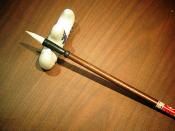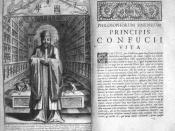Confucianism has been an underlying principle of Chinese Culture for 25 centuries. Confucius, or rather Kung Fu-tzu, is reverently refered to as the Kung the master and the first teacher. So profound is his impact on CHinese culture, that it survived the attempts by the first emperor shih huang ti and the cultural revolution of Mao to destroy it. Moreover, Mao even tried to portray himself as a Confucianist.
Formation of Confucius Confucius himself was never of any great stature in his life. He was not of nobility, "when young, I was without rank and in humble circumstances." Nor did he ever live the aristocratic. In fact his father died when he was only 3 years old. Moreover, he spent his childhood at menial jobs, hunting and fishing just to survive. However, Confucius would later devote his life to studying. He said, "On reaching the age of 15"æ I bent my mind on reading."
In order to understand why Confucius was so prominent in Chinese culture, one must understand that the times and problems which faced Confucius. Confucius lived in an era of pure Chaos marked with civil wars. In pure acts of brutality, rival states would kill 10's of thousands in a village. This was an era in which there was no order, this was the problem facing the scholars of the day. "How can we keep ourselves from destroying ourselves?" During this period many rival philosophies to Confucianism also originated to answer the problem of social anarchy. In fact, so numerous are the philosophies that this period became known as the hundreds school of thoughts period. Among the many philosophies 3 major thoughts arose: Confucianism, Mohism, and Legalism. Legalism felt that in order to achieve social order one must use force to subdue the human nature, which...


